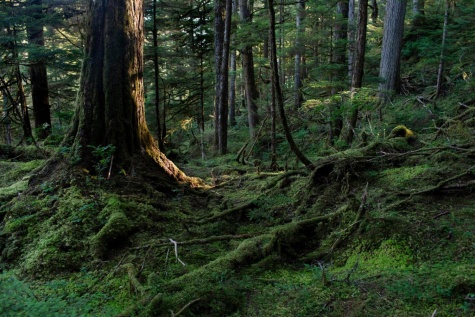
Gisele Brandt | Head Editor
November 1, 2020
Another ruthless attack on Alaskan wildlife was put into action on Thursday, October 29. President Trump has announced that more than 9.3 million acres of the 9.7 million forested acres of the Tongass National Forest will be opened to road construction and logging. This is a rollback on the protections placed on the Tongass National Forest in 2001 under the Roadless Rule Act, which prohibited road development and timber harvesting over 58.5 million acres of National Forest land.

The Tongass is the largest National Forest in America and the largest temperate rainforest in the world. Covering nearly 17 million acres of Southeast Alaska, the Tongass captures approximately eight percent of carbon gas emissions produced by the U.S. and contributes $127.7 million to the economy from tourism, accounting for 26 percent of local employment. The tourist economy in the park is largely run by the three Indigenous communities who rely on this land for jobs, sustenance, and cultural preservation. Tourists are attracted to the Tongass because of its rugged, untamed beauty and Native Alaskan cultures. “I am worried because deforestation is only going to make the amount of greenhouse gasses rise,” senior Sofia Osendorf said when reflecting on the threat of destruction to this invaluable piece of wildlife. “We will see habitats removed and animals struggling to adapt.”
The timber industry would damage the economy of Southeast Alaska. Firstly, it would disrupt the tourist industry as it would desecrate the intrinsic value of the land that attracts nearly two million people annually. Secondly, it would harm salmon and other wildlife populations due to habitat loss and increased pollution, which would take away from the annual million of revenue from the salmon fishing industry in the park. (Provigil) Lastly, the timber industry in the Tongass National Forest has lost 1.7 billion taxpayer dollars over the last 40 years. The cost to extract timber resources and to build the infrastructure to access them is typically paid for by the government due to subsidies and extremely low prices on trees from National Forest timber sale programs. Since 2001, only small timber operations were permitted on an individual basis in the Tongass National Forest, and in 2019, the timber operations cost the U.S. Forest Service $16.1 million. When averaged with the time preceding the Roadless Rule Act, it cost the USFS $44 million dollars a year. Additionally, “when they do projects [such as road construction], they don’t hire local labor, so our communities don’t benefit,” traditional Tlingit carver Joel Jackson explained. Economically and environmentally, opening up the Tongass for road construction and timber development will be a disaster.
If this move is not economically beneficial and the public has expressed its dismay for the possibility of development with 96 percent of public comments submitted to the USFS environmental review opposing the removal of protections on the Tongass, then what is the motivation? The Trump administration has largely been motivated by corporate interest and its primary goal seems to be to exploit every resource in our country until there is absolutely nothing left. The Secretary of Interior is a cabinet position which oversees and advises government operations related to parks, land, and some natural resources. The decision to rollback regulations and protections on wildlife is no surprise when looking at the man in this role, David Bernhardt. Bernhardt was confirmed as Secretary of Interior in 2019 after his predecessor, Ryan Zinke, was caught making land deals with oil companies in which conflicts of interests were involved, forcing him to resign. Bernhardt apparently learned how to do his job from Zinke, seeing as he was put under investigation four days after he was confirmed to his position for his involvement in the rollback of wildlife protections that would benefit his former clients in the California farming industry. He worked as an oil, coal, chemical, and agriculture lobbyist, dedicated to eroding environmental protections on wildlife and major pollutants previous to working in Trump’s cabinet. Following in the footsteps of Zinke, who opened up over half of Bears Ears National Park to mining, Bernhardt is also largely responsible for opening up the Tongass National Forest to logging and road development.
“The fact that he [Trump] doesn’t care about the well being of our country’s natural beauties is a huge problem. He is allowing this to happen so people can take advantage of what he views as an economic opportunity,” senior Ashley Lord said. The corruption and disregard for the will of the people and the environment is sad but unsurprising considering this administration’s track records.

We as a species need to seriously get our consumption under control – we can’t keep taking more and more from a finite system. It will eventually collapse. This short-term thinking has serious long-term consequences.